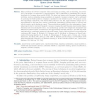Free Online Productivity Tools
i2Speak
i2Symbol
i2OCR
iTex2Img
iWeb2Print
iWeb2Shot
i2Type
iPdf2Split
iPdf2Merge
i2Bopomofo
i2Arabic
i2Style
i2Image
i2PDF
iLatex2Rtf
Sci2ools
158
Voted
SIAMIS
2011
2011
Large Scale Bayesian Inference and Experimental Design for Sparse Linear Models
Abstract. Many problems of low-level computer vision and image processing, such as denoising, deconvolution, tomographic reconstruction or superresolution, can be addressed by maximizing the posterior distribution of a sparse linear model (SLM). We show how higher-order Bayesian decision-making problems, such as optimizing image acquisition in magnetic resonance scanners, can be addressed by querying the SLM posterior covariance, unrelated to the density’s mode. We propose a scalable algorithmic framework, with which SLM posteriors over full, high-resolution images can be approximated for the first time, solving a variational optimization problem which is convex if and only if posterior mode finding is convex. These methods successfully drive the optimization of sampling trajectories for real-world magnetic resonance imaging through Bayesian experimental design, which has not been attempted before. Our methodology provides new insight into similarities and differences between spar...
Related Content
| Added | 15 May 2011 |
| Updated | 15 May 2011 |
| Type | Journal |
| Year | 2011 |
| Where | SIAMIS |
| Authors | Matthias W. Seeger, Hannes Nickisch |
Comments (0)

